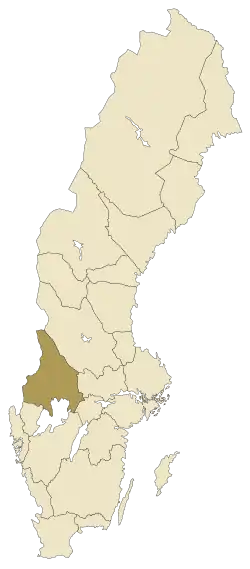
Värmland, archaic spelling Wermland, is a province (landskap) in the Svealand region in Sweden. It borders the provinces of Västergötland, Dalsland, Dalarna, Västmanland and Närke. It also borders Norway (Östfold and Hedmark) in the west and Sweden's largest lake, Vänern.
Cities
Other destinations
- 🌍 Fryksdalen, A region surrounding lake Fryken, known as the childhood home of author Selma Lagerlöf, including the cities Kil, Sunne and Torsby.
- 🌍 Glaskogen Nature Reserve
Understand
A mountain range along the Swedish-Norwegian border is called the Fjäll (though the word fjäll is used in middle Sweden for any type of mountain, cognate to northern English 'fell'). Typical for the Fjäll mountains are their rounded tops, usually lacking any well defined peaks. The upper part of the mountains usually rises above the tree-line and only shrubs grow there.
Get in
By plane
Karlstad Airport (KSD IATA) has daily flights to Stockholm and Copenhagen. Tickets are purchased from the airline Skyways. Another option is to fly to Oslo airport (Gardermoen) and go to Sweden from there.
By rail
SJ connects Värmland's cities with the rest of Sweden. On the website you can also buy tickets to Oslo in Norway, which is about three hours from Karlstad.
By car
The main arteries are the E18 road, which connects Karlstad with Stockholm and Oslo, and road 45 (Inlandsvägen) leading south to Gothenburg. Road 45 crosses the E18 just west of Karlstad.
Get around
Klarälvsbanan is a very good and level bike path to the north from Karlstad, in total 90 kilometers along the Klarälven river. It is a former railway track, so it is car-free. It is also very good for by roller skating.
Local and regional buses and trains are managed by Värmlandstrafik. Schedules and a travel planner is available at their site. Cash is not the best way to pay but prepaid cards which gives discount. Always buy advance.
Fryksdalsbanan, train, is considered very beautiful.
See
Museum Sandgrund in Karlstad. Contemporary art.
Do
- See also: Eurasian wildlife, Winter in the Nordic countries
- Safari. It's not Serengeti, but with a little luck you may encounter beavers, moose or even wolves. Wildlife safaris are organised from several towns. If you're lucky, you might even spot a rare white moose.
- Rafting on the river Klarälven is an interesting way of seeing the countryside. Slow wooden rafts, 4 by 4 meters, take you through the forests on 1-, 3- or 6-day trips. The trips start near Sysslebäck in the north of Värmland and go south from there. More info at the website of Sverigeflotten.
Rent a kayak in Karlstad. Get close up with beavers, see birds and the fresh water delta. Iceskating on lakes. Mariebergsviken in Karlstad prepares a track when weather permits.
Eat
- See also: Nordic cuisine
Moose meat (älgkött) is a widely available regional specialty. A dish served on special occations, especially outdoors is nävgröt med fläsk och lingon. Porridge with pork and lingonberries to be eaten with hands. Värmlanskorv is a sausage bought at supermarket. Any small village has a "pizzeria". Locally adapted pizzas served with cabbage. Pizza with kebab is popular for example.
Berries of the forest. Its for free and abundant in season. Mushrooms. Pick your own or buy at local market. At supermarkets its often import.
Drink
Drink water straight from the tap. It has good quality. Not from taps on trains or buses though. Buying bottled water is a waste of money. Alcohol with local flavours are sold at Systembolaget. Flavours are cloudberries and other kinds of "snaps". Syrups made from local berries can be found at supermarkets. Brand Torfolk is local from Torsby. Popular flavour is black currant. Check content for amount of berries. You get what you pay for..
Stay safe
- Like the rest of Sweden, Värmland is calm and you're not likely to be exposed to crime.
- You will need to wear a reflective clothing or badges if you walk or cycle along a road in the countryside in the dark, because of traffic.
- Bears can be dangerous although the risk of encountering one by accident is extremely small. Wolves are rare and no attack on a human has been recorded in living memory. Dogs however can be at risk.
- Ticks are probably the most dangerous wildlife, and carry infections. Use special tools to remove if bitten.